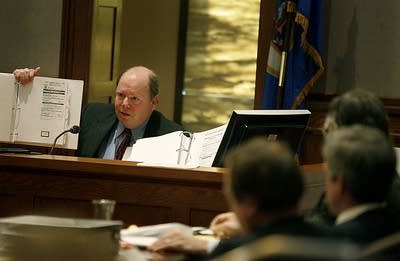Senate trial focuses on absentee processing
Go Deeper.
Create an account or log in to save stories.
Like this?
Thanks for liking this story! We have added it to a list of your favorite stories.

Ramsey County Elections Manager Joe Mansky returned to the witness stand Friday morning for day five of Republican Norm Coleman's Senate election contest trial.
Mansky testified about election procedures and policies regarding absentee ballots. His testimony is seen as a way to set a foundation for the proper way to count votes.
[image]
Approximately 31,000 absentee ballots were cast in Ramsey County in the Nov. 4 election, Mansky said. That's 31 percent more than the 2004 election, he said, attributing the increase to high numbers of first-time voters as well as absentee voting campaigns by candidates.
Turn Up Your Support
MPR News helps you turn down the noise and build shared understanding. Turn up your support for this public resource and keep trusted journalism accessible to all.
As part of his testimony this morning, Mansky described the procedure for rejecting absentee ballots. He said because of the high volume of absentee ballots, election officials do not spend more than 15 to 20 seconds reviewing each ballots. The sheer number of ballots made mistakes inevitable, he said.
"We don't have the means to really search all over the envelope for the information we're looking for," Mansky said. "If we don't see the information on or near the place we are looking for it, we're going to reject those."
Mansky said that some ballots rejected for missing signatures actually had the signatures. And he testified that judges were too tough in some cases where they ruled that a signature on an absentee envelope didn't match what the county had on file for the voter.

And, Mansky said that some ballots rejected for lack of a signature had mailing labels pasted over the instructions telling voters to sign, clearly a situation where it wasn't fair to hold the voter responsible, he said.
Mansky then addressed the three-judge panel, asking them what they would do.
"How much time are you prepared to spend on that, to determine whether or not the person has nominally met the legal requirements?" he asked.
From his experience, Mansky said voters who cast their ballot absentee do not have the same opportunity to correct errors, like signature mistakes, because they don't have the advantage of having an election official at a polling place to point out potential mistakes.
"So if they do make a mistake, the effects can be catastrophic. Because given the time and the distance involved, there may not viable remedy to deal with any errors they make," he said.

Also this morning, Mansky said he believes 62 ballots in Ramsey County were improperly rejected and should be counted.
It wasn't clear whether the problematic ballots Mansky acknowledged were among those that were later opened and added to the race during the statewide recount. Election officials around the state identified more than 1,000 such rejected absentees.
Both the Coleman and Franken campaigns had a say in which rejected absentees should be counted during the recount, but Coleman in his lawsuit has asked the judges to look at many more.
Franken opposes adding more than a few hundred additional absentees.
Coleman is trying to overturn the state Canvassing Board's decision that Democrat Al Franken received 225 more votes than Coleman.
Coleman was in court again Friday, as he has been throughout the first week of his lawsuit. Franken has not attended the proceedings.



